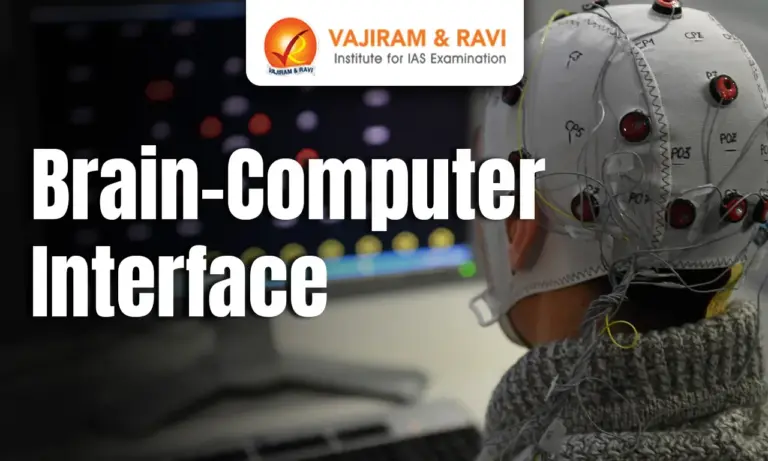Brain-Computer Interface (BCI) Latest News
Researchers at the University of California, San Francisco (UCSF) have developed a stable Brain-Computer Interface (BCI) that allows a paralysed person to control a robotic arm using only their thoughts, over 7 months, with minimal recalibration.
What is a Brain-Computer Interface (BCI)?
- A Brain-Computer Interface (BCI) is a system that enables direct communication between the brain and an external device, such as a computer or robotic limb.
- It decodes brain signals and translates them into commands to control machines, bypass damaged neural pathways, and restore lost functions in persons with neurological disorders.
- Earlier BCI systems could only translate brain signals into text, and that too with limited vocabulary, slow processing speed, and reduced accuracy.
How Does It Work?
- Sensor implantation: Electrodes were surgically placed on the motor cortex (brain region controlling movement).
- Signal interpretation: The system decodes neural signals of imagined movement, using machine learning to predict changes over time in signal patterns.
- Virtual training: The user was first trained using a virtual robotic arm, allowing refinement of mental control.
- Real-world application: The participant performed complex tasks like picking up blocks, opening a cabinet, and holding a cup under a water dispenser, indicating precise, consistent control.
Applications of BCI Technology
- The BCI also has potential for restoring speech in individuals with conditions like brainstem stroke or Amyotrophic Lateral Sclerosis (ALS).
- Fine electrodes and artificial neural networks can decode intended speech and generate text output, Audible speech, and a speaking avatar.
- One study showed a patient with ALS communicating at 62 words per minute, 3.4 times faster than previous BCI systems.
Brain-Computer Interface (BCI) FAQs
Q1. What is a Brain-Computer Interface (BCI)?
Ans. A Brain-Computer Interface (BCI) is a system that allows direct communication between the brain and an external device by interpreting brain signals, often for assistive technologies or medical applications.
Q2. What are the main applications of BCI?
Ans. BCIs are used in neuroprosthetics, communication for disabled individuals, gaming, cognitive training, and even military research.
Source: TH
Last updated on February, 2026
→ UPSC Notification 2026 is now out on the official website at upsconline.nic.in.
→ UPSC IFoS Notification 2026 is now out on the official website at upsconline.nic.in.
→ UPSC Calendar 2026 has been released.
→ UPSC Final Result 2025 is expected to be released in the first week of March 2026.
→ Check out the latest UPSC Syllabus 2026 here.
→ Join Vajiram & Ravi’s Interview Guidance Programme for expert help to crack your final UPSC stage.
→ UPSC Mains Result 2025 is now out.
→ UPSC Prelims 2026 will be conducted on 24th May, 2026 & UPSC Mains 2026 will be conducted on 21st August 2026.
→ The UPSC Selection Process is of 3 stages-Prelims, Mains and Interview.
→ Prepare effectively with Vajiram & Ravi’s UPSC Prelims Test Series 2026 featuring full-length mock tests, detailed solutions, and performance analysis.
→ Enroll in Vajiram & Ravi’s UPSC Mains Test Series 2026 for structured answer writing practice, expert evaluation, and exam-oriented feedback.
→ Join Vajiram & Ravi’s Best UPSC Mentorship Program for personalized guidance, strategy planning, and one-to-one support from experienced mentors.
→ Check UPSC Marksheet 2024 Here.
→ UPSC Toppers List 2024 is released now. Shakti Dubey is UPSC AIR 1 2024 Topper.
→ Also check Best UPSC Coaching in India
Tags: Brain-Computer Interface (BCI) prelims pointers upsc prelims current affairs


















